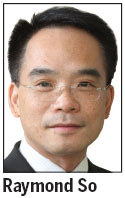Building up land reserve is a must
Updated: 2013-05-16 05:02
By Raymond So(HK Edition)
|
|||||||||
The SAR government has launched a new round of public consultations on land supply. One of the main themes of this exercise concerns the need for building up the land reserve of Hong Kong. When we just look at the numbers, Hong Kong still has a lot of undeveloped land. The tricky question is that undeveloped land faces many constraints in terms of making it available for development. For example, much of the land is classified as "green belt". If the government were to develop these green sites, it is quite certain that environmental protectionists will protest. The size and quality of land is also another consideration. Many pieces of land are just too small to have great development value. Other constraints include property rights and the need for conservation of old buildings. In short, there is a problem of land use in Hong Kong.
One of the focuses under discussion is reclamation of land from the sea. Legal constraints make reclamation inside Victoria Harbour impossible. The government is planning to reclaim land in Tuen Mun, Lantau, Sai Kung and the Ma Liu Shui. But any talk of reclamation elicits negative reaction from environmental groups, which is no surprise. A lot of environmental protection groups often cite figures that Hong Kong still has 2,100 acres of land for residential purposes and the need for reclamation is not large. Nevertheless, the opposition voice just overlooks the fact the so-called 2,100 acres of land is just a numerical number. When we talk about land, land is not additive in terms of number. We may have a number of small pieces of land. When we add up the number, the total acres could be large. However, the value for development may not be high. In other words, we simply cannot just look at the numbers in land economics.

If we cannot just look at the numbers alone, in order to have a smooth demand and supply relationship in land, we strongly need a stable land reserve. If we have a sizable and stable land reserve, any ups and downs in the property market can well be absorbed by changes in land reserve. The idea of reclamation comes from the need to build up Hong Kong's land reserve. And, building up a sustainable land reserve is the key for the future development of Hong Kong.
Hong Kong is often criticized by people who say that high land prices hurt the living and worsen the business environment. The recent shortage of land for housing further worsens the situation. After the 1997 Asian financial crisis, because of the drop in property prices, Hong Kong simply gave up building a long-term land reserve. When the economy recovers, the demand for land also increases. All of a sudden demand for land exceeds supply. Textbook economics tell us that the solution is to increase supply of land. However, the supply of land is rather inelastic. Normally, it takes several years to make a piece of land ready for development. Because the land reserve has been amortized over the years, there is simply not enough land for development. If we were to restart the land reserve, it will take several years before the first piece of land can be used. Hence, when we talk about reclamation, the reclaimed land is not to be used in the near future. Rather the reclaimed land is kept as reserve for future use.
The idea is similar to personal savings. One needs to save up for the rainy days. Building up a land reserve is just the same as building up one's own savings. From this point of view, the negative voices against reclamation also disagree with the need for building up land reserve. To the opposition parties, the 2,100 acres of land is the best land reserve and there is no need for reclamation. However, as explained above, the so-called 2,100 acres of land are not enough to meet the demand. To ascertain Hong Kong has enough land for further development, we need to build up a land reserve. To achieve this aim, we should not rule out any possibility, and reclamation should also be one of the choices.
It is understood that there are many environmental concerns in reclamation. Nevertheless, we also need to balance the good and bad sides of reclamation. It is true that reclamation will change the environment, but one cannot just protect the environment at the expense of the livelihood of the whole population in Hong Kong. Because reclamation is the means to building up land reserve, we should not just look at the adverse impacts of reclamation on the environment. We should evaluate reclamation together with the benefits of the land reserve. The current debate only focuses on the downside of reclamation, which fails to address the root of the issue. Therefore, it is not surprising the debate over reclamation centers on emotional feelings, rather than concrete evidence. But emotional feelings are hard to compromise. Surely the heated debate still goes on and many more diverse opinions will occur.
The author is dean of the School of Business at Hang Seng Management College.
(HK Edition 05/16/2013 page9)